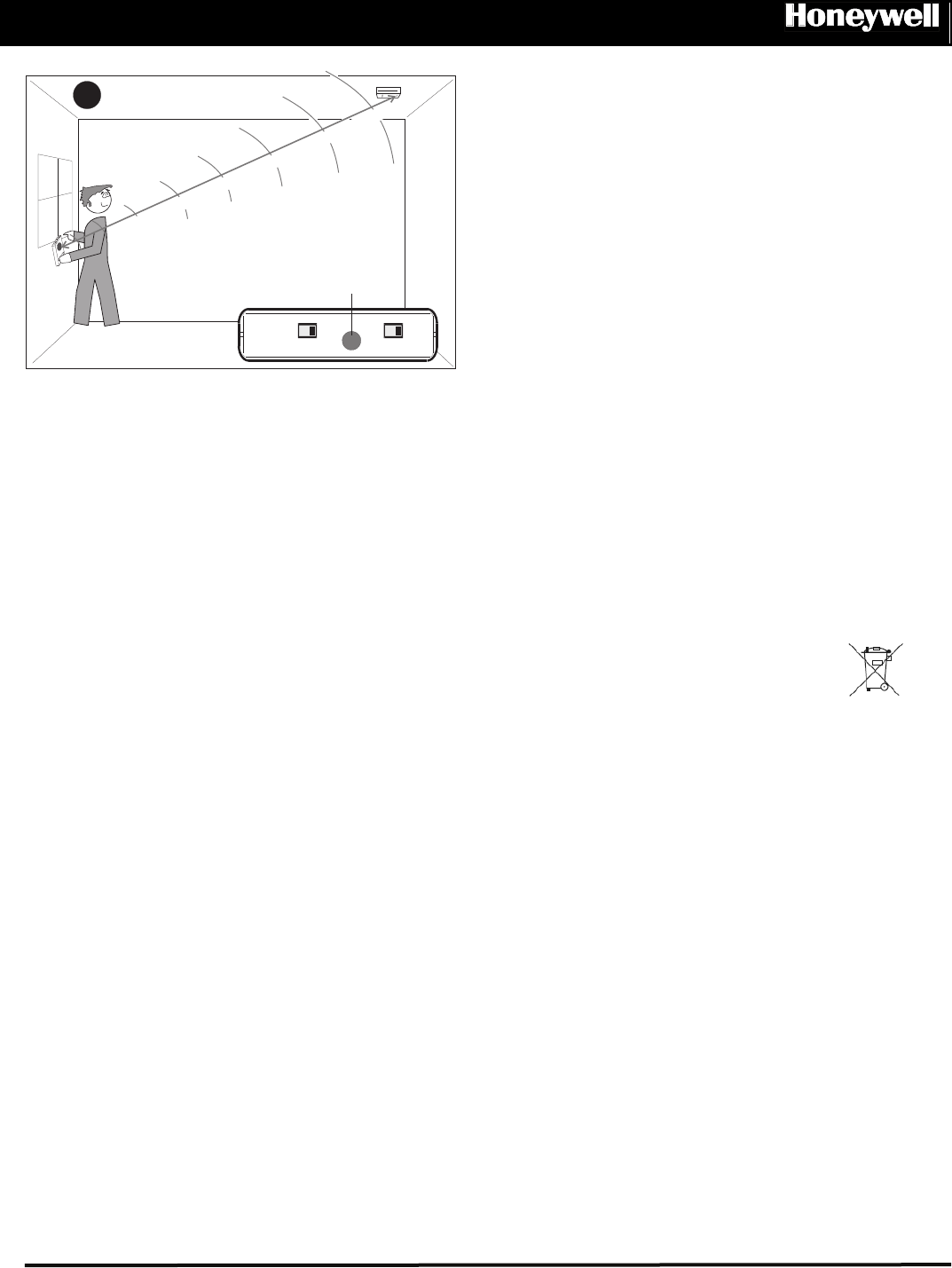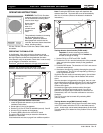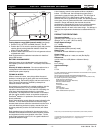
English FG-701 Glassbreak Simulator
- 2 - 5-051-320-00 Rev. D
Detector
Farthest point of glass to be protected by detector
C
RED
Button
FLEX
MAN
ACTIVATE
TEST
Testing detector range [MAN (manual) mode] (continued):
1. Set the FG-701 to TEST and MAN (manual). See
C.
2. Position the FG-701 near the protected glass and point the
speaker directly at the glassbreak detector. Watch the
green LED on the detector.
3. Press the RED button and the FG-701 will generate a burst
of glassbreak
audio
.
Refer to the detector’s installation instructions for details of
green LED function.
BATTERY ANNOUNCEMENT
When the battery is low, the simulator
audio
sound will be
interrupted by the word "BATTERY." The battery must then be
replaced.
Use only 9V alkaline batteries. Do not use carbon-zinc or
rechargeable Ni-Cd batteries because they don’t have
sufficient peak power capacity.
TECHNICAL NOTES
When a window is broken, many things affect the sound
produced, including type of glass, glass size and thickness,
type of mounting, the breaking object, and how much force is
used. The sound will also be modified by absorptive or
reflective surfaces in the room.
No simulator can account for all possible conditions, but the
sound produced by the FG-701 is carefully designed to
represent a worst-case break. The sound is a recording of a
small pane of tempered glass broken in a controlled
environment. The output level of the simulator is correlated
with the original sound to insure an equivalent response in
FlexGuard
®
detectors. In production, the acoustic output is
factory-calibrated.
Room characteristics greatly affect the range indicated by the
simulator. A room with hard surfaces will increase range,
because hard surfaces reflect the sound back into the room. A
room with absorbing surfaces (carpets, acoustic tiles) and
absorbing materials (curtains and soft furniture) will reduce
range.
Real glassbreak sound is affected in the same way as the
simulator sound because it has the same frequency content
and originates from the same location in the room. So the
audio range indicated by the FG-701 is a good indication of
glassbreak detection range.
A low frequency sound is also produced when a window is
broken. In FLEX mode, the low-frequency signal (
flex
) is
generated by gently thumping the window. The
flex
signal is
detected by the FG-701 which sends a burst of
audio
. If
sufficient
flex
can be generated by a safe, non-breaking thump
to the glass, there is good assurance that a real break will be
detected. Range indicated by the simulator should be
considered the safe detection range for an individual detector.
Because of component tolerances do not assume that a
substitute detector will work at the same range. If a detector is
changed, the replacement should also be tested with the FG-
701.
PRODUCT SPECIFICATIONS
Temperature Range:
Operating:
32ºF to 122ºF (0ºC to +50ºC)
Storage:
-4ºF to +140ºF (-20ºC to +60ºC)
Output Spectral Range:
1.5 - 16 kHz
Estimated Battery Life:
2500 operations [MAN (manual) mode]
Battery Type:
9V Alkaline, Duracell MN1604 or equivalent
Output Level:
Approx. 110dB peak at 1 meter, on axis (Re 20µPa)
Dimensions:
3.25"W x 6.3"H x 0.9"D (83mm x 160mm x 23mm)
Weight:
8 oz. (.23 kg)
Approvals/listings:
CE
C-Tick
To obtain applicable EU compliance Declaration of Conformities for this product,
please refer to our Website,
http://www.security.honeywell.com/hsce/international/index.html.
For any additional information regarding the compliance of this product to any
EU specific requirements, please contact:
Quality Assurance Department,
Honeywell Security & Custom Electronics,
Newhouse Industrial Estate
Motherwell,
Lanarkshire ML1 5SB,
Scotland,
United Kingdom.
Tel: +44(0)1698 738200
Email: UK64Sales@Honeywell.com
Please contact your local authorised Honeywell representative for product warranty information.
Copyright 2009 Honeywell International Inc. Honeywell and FlexGuard are registered
trademarks of Honeywell International, Inc. All Rights Reserved
Made in China




